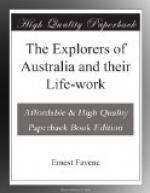During the crisis, the boat had drifted untended, and grounded on the sand. While the men were hastily pushing her off, they caught sight of “a new and beautiful stream coming apparently from the north.” A crowd of natives were assembled on the bank of the new river, and Sturt pulled across to them, thus creating a diversion amongst his erstwhile foes, who swam after, as he says, “like a parcel of seals.”
After presenting the friendly native with some acknowledgement and refusing presents to the others, the pioneers examined the new river. The banks were sloping and well-grassed, crowned with fine trees, and the men cried out that they had got on to an English river. To Sturt himself the moment was supreme. He was convinced “that we were now sailing on the bosom of that very stream from whose banks I had been twice forced to retire.” They did not pull far up the stream, for a native fishing-net was stretched across, and Sturt forbore to break it. The Union Jack was, however, run up to the peak and saluted with three cheers, and then with a favouring wind they bade farewell to the Darling and the now wonderstruck natives.
As they went on, the party landed occasionally to inspect the surrounding country, but on all sides from their low elevation they could see nothing but a boundless flat. The skiff being now only a drag upon them, it was broken up and burnt for the sake of the ironwork. On account of the damage to the salt pork caused by the sinking of this boat, the strictest economy of diet had to be exercised, and though an abundance of fish was caught, they had become unattractive to their palates. The continuation of the voyage down the course of the Murray was henceforth a monotonous repetition of severe daily toil at the oar. The natives whom they encountered, though friendly, became a nuisance from the constant handling and embracing that the voyagers had, from purposes of policy, to suffer unchecked. The tribes met with were more than ordinarily filthy, and were disfigured by loathsome skin diseases. After twenty-one days on the water, Sturt began to look most anxiously for indications of the sea, for his men were fagging with the unremitting labour and short rations, and they had only the strength of their own arms to rely on for their return against the current. Soon, however, an old man amongst the natives described the roaring of the waves, and showed by other signs that he had been to the sea coast. But more welcome than all were some flocks of sea-gulls that flew over and welcomed the tired men.
On the thirty-third day after leaving the starting-point on the Murrumbidgee, Sturt, on landing to inspect the country, saw before him the lake which was indeed the termination of the Murray, but not the end that he had dreamt of. “For the lake was evidently so little influenced by tides that I saw at once our probable disappointment of practical communication between it and the ocean.”




